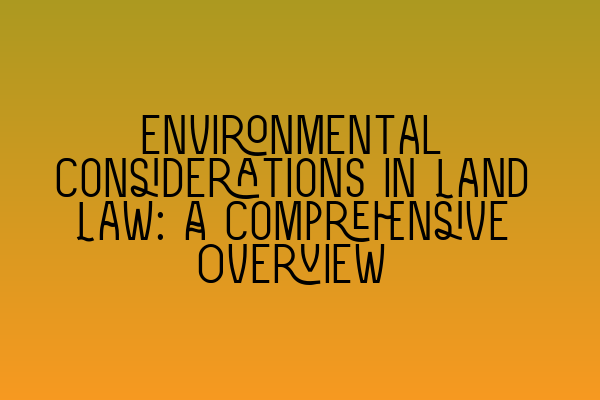Environmental Considerations in Land Law: A Comprehensive Overview
In today’s rapidly changing world, environmental concerns are at the forefront of discussions across various sectors, including property law. As a solicitor specializing in property law, it is crucial to have an in-depth understanding of the environmental considerations that may impact a client’s land.
Environmental considerations in land law encompass a wide range of issues, including but not limited to pollution, conservation, sustainability, and compliance with environmental regulations. These considerations not only have legal implications but also carry significant socio-economic and ethical weight.
To provide you with a comprehensive overview of environmental considerations in land law, we will delve into some key aspects that every property law practitioner should be familiar with.
1. Environmental Impact Assessments:
Environmental Impact Assessments (EIAs) play a crucial role in assessing the potential environmental effects of proposed developments on land. These assessments aim to identify and mitigate any adverse impacts that may arise from the development, ensuring sustainable development practices.
Understanding the process and legal requirements of conducting an EIA is essential for property law professionals. It helps ensure that clients are compliant with environmental regulations and can navigate potential legal challenges related to environmental impact.
2. Contaminated Land:
Contaminated land is another significant environmental consideration in property law. Purchasing or developing contaminated land can lead to a multitude of legal and financial risks. It is crucial to identify, assess, and appropriately deal with any contamination issues to protect clients from potential liability and safeguard the environment.
Due diligence and thorough investigation of the history of the land, including its previous uses, are essential to identify potential contamination risks. Engaging with environmental consultants and experts can provide valuable insights into mitigating the risks associated with contaminated land.
3. Conservation and Protected Areas:
Preserving and protecting the natural environment is of utmost importance in land law. National parks, protected areas, and sites of scientific or historical importance require special consideration to ensure their conservation.
Understanding the legal frameworks and regulations surrounding conservation areas and protected sites is crucial when advising clients on land transactions. Compliance with these regulations is necessary to avoid legal complications and potential penalties.
4. Climate Change and Sustainability:
Climate change and sustainability are significant global challenges that have a direct impact on land use and property development. Sustainable development practices and reducing carbon footprints have become crucial considerations in property law.
Advising clients on sustainable design, renewable energy initiatives, and green building practices can help them meet environmental standards while also providing long-term benefits such as cost savings and increased market value.
5. Environmental Liabilities and Insurance:
Environmental liabilities can have severe financial implications for landowners or developers. Potential liabilities may arise from activities impacting the environment, such as pollution, hazardous waste, or water contamination.
Understanding environmental insurance options and including appropriate clauses in contracts can help mitigate risks associated with potential environmental liabilities. A proactive approach to addressing and managing these risks is essential for protecting clients’ interests and minimizing legal disputes.
In conclusion, environmental considerations in land law encompass a broad spectrum of issues that demand careful attention and expertise. As property law practitioners, it is our responsibility to guide clients in navigating the legal complexities while ensuring compliance with environmental regulations.
An in-depth understanding of environmental impact assessments, contaminated land, conservation, climate change, and environmental liabilities is crucial in providing effective legal counsel. By integrating these considerations into our legal advice and transactions, we can contribute to sustainable and responsible land use practices.
If you are interested in furthering your knowledge in property law and land law to ensure you are well-prepared for the SQE exams, consider checking out our related articles:
– SQE 1 Practice Exam Questions
– SQE 1 Practice Mocks FLK1 FLK2
– SQE 2 Preparation Courses
– SQE 1 Preparation Courses
– SRA SQE Exam Dates
These resources will provide you with the necessary tools and guidance to excel in your property law and land law studies and pave the way for a successful career in the legal profession.
Remember, integrating environmental considerations into your practice is not just a legal requirement; it is a responsibility towards a sustainable future.
